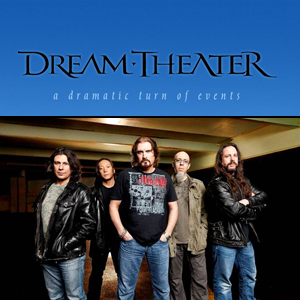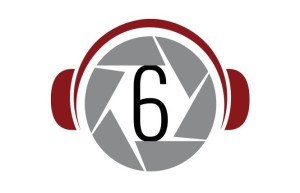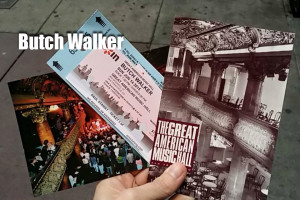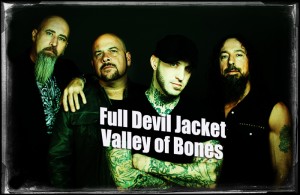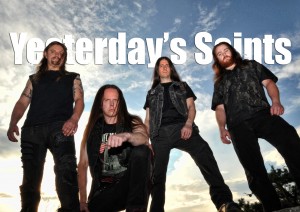Hymn of a Broken Man: A Conversation with Times of Grace
15 min read
 It’s hard to imagine that the idea of suffering as a necessary part of life. After all, we live in a country that finds difficulty fitting suffering in between the idea that we’re all entitled to a white picket fence and a two week paid vacation every year. But as I reflect on this idea – the idea that we all go through periods in which we suffer – it’s impossible to deny that quite often the only time we can experience growth is after we’ve gone through our fair share of shit. This goes a little against the idea of suffering, especially in the context of the modern dogma of the American church and that brand of Christianity that would have you believe that you can bypass some of our suffering through prayer, giving (or tithing) and saying the right words to your god. But the reality is more akin to the idea that in order to live and become the person we must become – you MUST endure your share of bad times in order to appreciate the good stuff – no matter how long it takes to become that person. No one in my recent memory has conveyed this idea better than Jesse Leach and Adam Dutkiewicz (former and current members of Killswitch Engage) who understood quite well when crafting their current album “Hymn of a Broken Man” under a new band called Times of Grace that sometimes our darkest times carry us to places where we can find peace. And it’s THAT peace that carries us through that darkness. And it’s in the midst of that uncertainty that requires that we grab onto the kind of peace, hope and love that is also fused with a bit of patience and dash of endurance and can only be fully understood if you experience a little bit of grace to help lift your spirit. After all – the dark times may be darker than we’re comfortable with and they may also last longer than we are prepared to accept. But as you will soon see as Circle Six caught up to Jesse Leach of Times of Grace, sometimes it takes a while to finally become comfortable with the person that we eventually become.
It’s hard to imagine that the idea of suffering as a necessary part of life. After all, we live in a country that finds difficulty fitting suffering in between the idea that we’re all entitled to a white picket fence and a two week paid vacation every year. But as I reflect on this idea – the idea that we all go through periods in which we suffer – it’s impossible to deny that quite often the only time we can experience growth is after we’ve gone through our fair share of shit. This goes a little against the idea of suffering, especially in the context of the modern dogma of the American church and that brand of Christianity that would have you believe that you can bypass some of our suffering through prayer, giving (or tithing) and saying the right words to your god. But the reality is more akin to the idea that in order to live and become the person we must become – you MUST endure your share of bad times in order to appreciate the good stuff – no matter how long it takes to become that person. No one in my recent memory has conveyed this idea better than Jesse Leach and Adam Dutkiewicz (former and current members of Killswitch Engage) who understood quite well when crafting their current album “Hymn of a Broken Man” under a new band called Times of Grace that sometimes our darkest times carry us to places where we can find peace. And it’s THAT peace that carries us through that darkness. And it’s in the midst of that uncertainty that requires that we grab onto the kind of peace, hope and love that is also fused with a bit of patience and dash of endurance and can only be fully understood if you experience a little bit of grace to help lift your spirit. After all – the dark times may be darker than we’re comfortable with and they may also last longer than we are prepared to accept. But as you will soon see as Circle Six caught up to Jesse Leach of Times of Grace, sometimes it takes a while to finally become comfortable with the person that we eventually become.
C6M: So, I’ve been listening to the album, Hymn of a Broken Man for several weeks, and I want to talk a little bit about the idea of this album and how it came about, and working with Adam again.
Jesse Leach: Right on.
C6M: So, you were the original lead singer of Killswitch, and been on separate paths for a few years now, and suddenly you’re working together with a former band mate (from Killswitch). How did that come about?
Jesse Leach: Well, it’s been amazing. And how it came about was, Adam threw his back out four years ago, and had to have emergency surgery. So, while he was recovering from the surgery, we were sort of wondering if he was ever going to perform again, ever walk again even, and in order for him to cope with that and being stuck in the bed, he wrote this record pretty much in his head with the help of a handheld Dictaphone. And when he was back on his feet, he was able to demo the record, that’s when I got the phone call. And basically, he told me he had a whole record full of music, and he couldn’t think of anyone else to go out and have sing on it than me. So, I of course was extremely flattered and excited, and of course accepted the offer, and you know, the rest is history.
C6M: Right. Well, I was reading that it was sort of a secret project for a little while, so how hard was it to keep that secret?
Jesse Leach: Yeah, it was definitely tough to keep under wraps, but you know, out of respect for the Killswitch camp, and then you know, I myself was in a band at the time called Seemless. We just felt like we wanted to sort of keep it to ourselves until something came out of the music lane, and then maybe we can decide what we wanted to do with it yet, but we don’t want to sort of alarm anybody or anything until we were sure we were going to go through with this and create this record. So, yeah, at first it was tough, but then you know, when everyone found out about it, everyone was supportive.
C6M: Was that weird though? Was that weird to get sort of the blessing of Killswitch, to pursue wherever Times of Grace was going to lead you guys, even in terms of being like a side project?
Jesse Leach: Yeah, no, absolutely. And I don’t think anyone anticipated it doing as well as it has so far, but yeah, it’s definitely weird, but I think it’s great. It just goes to show we’re all friends, there are friendships involved. All of these bands that we’ve been in, we’ve been blessed to be with friends. So, those guys support us, and in fact Joel was even in on the last band. So, we got the two act men from Killswitch playing guitar. So, all in all, man, it’s been an absolutely wonderful experience, and I’m just really — I feel really blessed, a gratitude for all the support we’ve gotten so far, it’s been great man.
C6M: Well, back to the album, you definitely tackled some tough subjects, especially when it comes to the faith element in lyrics. The album, if nothing else is — how do I put that, very dynamic in its presentation of some dark subjects. But at the same time, it’s also sort of part song, part hymn, part anthem. When you guys were creating this album, was the intent to create an album that was sort of this cohesive and driven, both musically and lyrically?
Jesse Leach: I mean I’m sure that we wanted to do that, but this album was really just sort of — in retrospect, it was sort of just a stream of consciousness for the two of us. You know, a lot of stuff happened — I would come to the studio with lyrics and ideas, he’d have lyrics and ideas, and we would just sit down and go through the songs and start singing and stuff just happened. I mean it was very, very spontaneous. So, it wasn’t a lot of discussion of “Oh, this part should sound like this or this song should sound like that,” or “Oh, this topic needs to tie into the next song.” It honestly was a feeling of the two of us sort of being instruments and channeling this one thing that we were sharing, this energy, this feeling. We were both in really dark places in our lives, and this record was the connection for the two of us, and yes, conscious — a stream of consciousness. It sounds funny to say that, but it’s really how this was made, it just came out of us.
C6M: Well, it’s definitely interesting, because as I reflect on the ideas that are presented on this album, the most interesting thing that I’ve come away with it is that there’s this idea of creating a positive out of a negative for example. Even in terms of how the genesis of the album, like you said, Adam being in (the) hospital. Do you think that ultimately if you guys were to relay any message at all, it would be ultimately that there is hope even in dark times?
Jesse Leach: Absolutely. I would say that that’s definitely the end result, and sort of by default the running theme of the record. And I think it’s survival instinct. It’s like either sink or swim, that whole idea or the whole notion, and you feel like in your dark times, you’ve got a few choices. You can either continue to wallow, which eventually maybe lead to suicide or doing something rash, or you just pull yourself up and — I think it’s a mixture of determination and just having faith and through God’s grace. And I think that those two things really helped us shape this record. You know, we never sort of lost hope, even when we were in our darkest times, and I love that, for people to walk away with that. So, you saying that, that makes me happy. It turned out to be the theme, for sure man.
C6M: Yeah, it definitely resonates. And continuing on with that, are you surprised with the fans. They connect so deeply with the material so soon. I mean I was just like on a bunch of social media sites, just reading comments about how this particular album seems to have reached certain fans at the right time for them. Do you find that flattering and encouraging at the same time?
Jesse Leach: I do, but I also feel a little overwhelmed about it, because it has been very quickly this has happened. In fact, I had a Facebook account that was just for my professional use only, to promote whatever event I was in, and I actually deactivated the account. I couldn’t keep up with the amount of messages and like the heavy, heavy emails I was getting from people, telling their life stories, and it got to the point where I was actually honestly overwhelmed and I couldn’t handle it anymore, so I deactivated the account. And here’s the thing. It’s amazing to me, and I’m so flattered and humbled by it, but there’s a certain amount where I need to keep things at arms length, because I’m only a man. I’m only a musician. I’m not somebody’s savior, and some of these messages I was getting, like people really desperate place and looking towards my music to be their salvation. And I believe your salvation only comes from God, so it gets a little overwhelming after a while.
C6M: Oh yeah.
Jesse Leach: But it’s amazing, don’t get me wrong, it’s absolutely amazing, it’s incredible. I’m a pretty normal guy. I get overwhelmed easily.
C6M: Well, it’s a pretty common thing though. I guess it’s a product of being in the entertainment industry, and I guess putting your — sometimes your hopes in a human being rather than an idea or in God. It definitely can, it’s like worshipping the creation versus worshipping a creator, so to speak.
Jesse Leach: That’s well spoken, well spoken, yeah.
C6M: In hopes of — in the lyrics that you have in Hope Remains, you say “Hold onto faith, hold onto love, hold onto who you are,” I think that’s a great message. If there was anything that you were trying to convey in that album, would that be it, or would you say that that would be the crux of the entire album in terms of its message?
Jesse Leach: I don’t know. It’s hard for me to say that. It’s definitely a major point I think we were making. But I think it’s a little more than that. I think it was definitely — I think for me, being in the struggle and being in those dark times, it was also important, because you’re not going to have that immediate redemption. You’re not just going to bounce out of it. Like sometimes these periods in our lives last a long time, so I think suffering is definitely part of the scene. And in a realistic situation, you’ve got to fight, it’s always a fight to maintain your sanity and that you’ve got to hope a lot. So, I think there’s a lot of struggle and pain also as part of the theme. And I think that’s important, not only because I feel like a lot of people can relate to that, and maintaining — go ahead.
C6M: Oh no, I definitely agree, because as I was listening to it, the one thing that I appreciated was that throughout the album, it was presented in such a way that there was always hope, but there was no easy answer. And I really appreciated that from a strictly human point of view of struggling through your — just struggling through everything. I appreciated the anthem that it presented as a sort of “just carry on” message.
Jesse Leach: Yeah, I mean for me — I can see for myself, I was raised a Christian by a minister, so my faith was always intact most of my life, but you know, when you get to that point when you sit and you question things, and you really think about it, and you doubt it, and you go through that dark time. And you wonder where’s God during all this time? When you hit that point as somebody who’s been raised in the faith, that’s when everything sort of comes into focus, and you really learn about who you are. And you really either cling to your faith or you lose it. And by the grace of God, I clung to it, and it taught me so much about my faith, where I feel like I took my faith for granted before. I just kind of went along with what I was told my whole life, and then when I finally had a crisis, I realized, “Okay, yeah, this is real to me only because I did question it, only because I did doubt things.” And I think that’s a really important thing for anybody who believes in anything. You can’t just swallow it. And it’s not easy, it’s not easy, life is not easy. But to me, that’s the beauty of life, we all struggle and suffer. And coming out of those situations with that pain and with those scars, it makes it so much more real, and people can relate to that, I’m sure.
C6M: Right. So, is it more gratifying when you complete the album, that you can look back and see that struggle and also feel like the completing of that process sort of is its own reward?
Jesse Leach: Yeah, absolutely. I mean you can’t — you know, everything happens for a reason, and that’s kind of how I feel as far as, you know, in terms of this record being created, because like what happens if I didn’t go through all of that? I wouldn’t have written this record and I wouldn’t have had the potential to affect a lot of people with what I did, and what Adam and I did. We talk about this a lot. You can’t regret your past, you just have to move forward. And I don’t regret what I went through, I don’t regret the dark times, and I don’t regret questioning everything. Because you know what I mean, at the end of the day, it was supposed to happen. It gets you to a point where you’re just humbled by it. It brings to your knees where you sort of just have to surrender to it, and roll with the punches, you know. And I think they’re both important. It’s important to go through it.
C6M: Sure. Yeah, yeah, I was reading a book where it basically says that same thing, that you’re basically — you go through life and you’re molded into the person you’re supposed to be through your experience, whether you realize that or not. So, I definitely think that this album sort of speaks to that in a very deep and meaningful way.
Jesse Leach: Yeah, and a funny side note too is like I like who I am now, I’m comfortable with who I am now. And honestly, prior to that, prior to this dark time in my life, I was a bit insecure and I wasn’t entirely sure of who I was, and this challenge helped me to sort of come to terms with who I really am. So, that could be said for anything, you know, like it’s amazing to go through that.
C6M: That is. That’s very cool. Well, I’ve had the opportunity to talk to a few bands in regards to their beliefs and how that affects their lyrics. And the most interesting quote that I heard actually, it came from Bono, and I read this to a lot of different people, and it’s interesting to get their take. So, I wanted to know what you thought about it. But is your approach to writing lyrics akin to kind of drawing a fish in the sand and it’s there for those who are interested and invisible to those that aren’t?
Jesse Leach: Wow, that is very interesting. I think I can see how that would — I can relate to that definitely. Because I feel like first and foremost, I write what I feel. I write what comes from my heart. Being a Christian and someone who believes in that, that obviously is going to come through in my lyrics. When I’m writing, I’m consciously thinking about for me, I want to reach out to everybody. I don’t want anyone to feel excluded I don’t want anyone to draw any conclusions from the lyrics, except for what they feel. So, as an artist, I take it more as an art form, than it is a ministry. And I think that there’s a place for everyone in this world, just like my father, who’s a minister, he’s great at what he does, he’s amazing, but I’m not that person, that’s not my gift. I would rather present somebody a painting, a full detailed picture, and then I can stand in front of them and go, “Ooh, that might be this,” or “Ooh, I like this,” and I would just stand there and nod and smile and just say, “No, no, no, it’s actually this,” because I love the idea of people walking away with their own notion of what the song is about. And often times it can be a lot more powerful than anything that I could have come up with. And that personal experience, that personal bond, is something I never want to take away from my fans.
C6M: Sure, and that really — I guess that speaks to art itself, I mean. And the beauty of that, because once it’s created, it no longer is yours. It sort of belongs to the person who embraces it.
Jesse Leach: Exactly my friend. And it’s funny too, because I’ve gotten flak. There are fellow Christians, who are like “That’s wrong. You shouldn’t be doing it that way.” And I’m like, “You know what? No, I should be, because that’s the way I’m doing it.”
C6M: Right, right.
Jesse Leach: But you know, not everyone is going to love it, but you know, you can’t please everybody though.
C6M: Oh no, absolutely not. I wanted to leave you with this quote. I read this yesterday, and I thought it was perfect in terms of, as I was thinking about preparing for our conversation. And it’s attributed to this guy named Larry Lane, and he said that “If perfect theology is the requirement for grace and forgiveness, then we are all toast.”
Jesse Leach: Absolutely, amen, carve that in the sky [laughter]. That’s beautiful. You know what it for me is when I realized, what being a Christian means to me, has changed. Prior to me going through my rock bottom phase of my life, where I was on the end of my road in my mind, I saw Christianity differently than I do now. And I feel like Christianity is all you’re doing to acknowledging that you’re just as equally screwed as everybody else is in the world. But the one difference is that you can turn to your God and ask for forgiveness and he’ll forgive you. So, I feel like if you’re a real Christian, you need to humble yourself.
C6M: Yeah, totally.
Jesse Leach: And I think a lot of Christians get self-righteous, they tend to point the finger. And you know what, I’ve been getting the finger pointed at me, and all I can do is just kind of chuckle about it and go, “Okay. Well, that’s a contradiction to what I believe being a Christian is.” So, humble yourself, you know. We’re all equally screwed in this world, but we have salvation by the grace of God.
C6M: Yeah, definitely. Well, I just wanted to thank you for taking the time to talk with me, and I wish you guys a lot of success on the record and kicking off the tour, and I’ll be seeing you guys at the Troubadour.
As I was reflected on this interview and going through my own share of junk that life has been throwing at me I must confess, I feel encouraged to know that I am not alone in this journey called life. The album is more than a collection of songs, it’s a symphony of what it means to be human. Once again, special thanks to Jesse Leach from Times of Grace for taking time out of his schedule to speak with Circle Six. If you haven’t picked up Times of Grace’s album “Hymn of a Broken Man” you really should. I haven’t heard anything this charged with relevance in years. If you happen to catch a show and have to opportunity to talk to the band, don’t forget to let them know that Paul sent ya.


